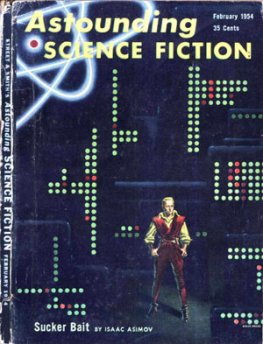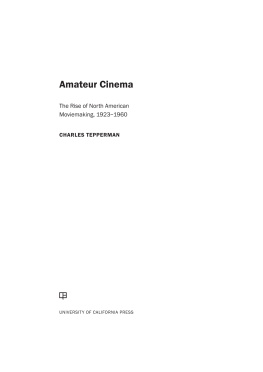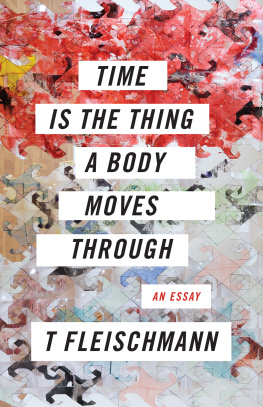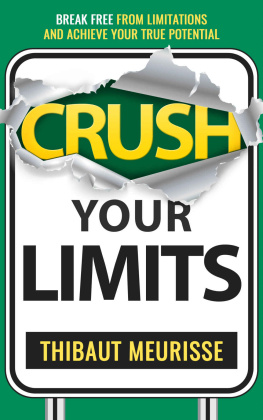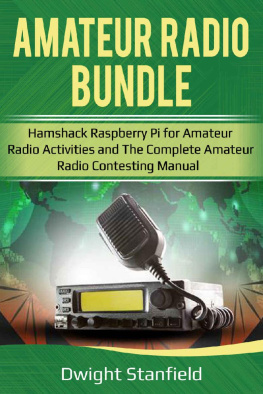Lee Correy - Amateur
Here you can read online Lee Correy - Amateur full text of the book (entire story) in english for free. Download pdf and epub, get meaning, cover and reviews about this ebook. year: 1954, publisher: Street & Smith Publications, Inc., genre: Science fiction. Description of the work, (preface) as well as reviews are available. Best literature library LitArk.com created for fans of good reading and offers a wide selection of genres:
Romance novel
Science fiction
Adventure
Detective
Science
History
Home and family
Prose
Art
Politics
Computer
Non-fiction
Religion
Business
Children
Humor
Choose a favorite category and find really read worthwhile books. Enjoy immersion in the world of imagination, feel the emotions of the characters or learn something new for yourself, make an fascinating discovery.
- Book:Amateur
- Author:
- Publisher:Street & Smith Publications, Inc.
- Genre:
- Year:1954
- Rating:4 / 5
- Favourites:Add to favourites
- Your mark:
- 80
- 1
- 2
- 3
- 4
- 5
Amateur: summary, description and annotation
We offer to read an annotation, description, summary or preface (depends on what the author of the book "Amateur" wrote himself). If you haven't found the necessary information about the book — write in the comments, we will try to find it.
Amateur — read online for free the complete book (whole text) full work
Below is the text of the book, divided by pages. System saving the place of the last page read, allows you to conveniently read the book "Amateur" online for free, without having to search again every time where you left off. Put a bookmark, and you can go to the page where you finished reading at any time.
Font size:
Interval:
Bookmark:
Amateur
by Lee Correy

Illustrated by van Dongen
Fill her up again, Martin.
Marlin, the bartender, looked coldly at him, pursed his lips, and said slowly, Sorry, Enright. No more.
Put it on the cuff, Martin, Henry Enright replied in a bluff tone. My credits good.
Yeah? You aint paid a cent over this bar for two months, Martin pointed out, wiping his hands on his apron. He then put his hands on the wet bar top in front of Enright and went on indifferently, The boss just told me no more. Ya see, he just made an agreement with the bank: they dont sell liquor, and we dont lend money. We dont run no hock shop, either; so dont try to gimme your watch for a drink.
Enright was just a bit tipsy, but that was not unusual. He had a vague recollection that this had happened before in other bars. In fact, he realized he would not be drinking here in this dark and dirty dive except that, up to now, Martin and his boss had been easy on him.
He pushed back his stool and let it fall to the floor. Looking slowly all around, he addressed the five other patrons, each as shabby as himself. His voice was loud and his words slurred with alcohol. Did you hear that? Martin just said my credits no good! Me, the best rocket engineer in the business! Why Ive burned up more alcohol in sixty seconds than this lousy joints ever poured! Now I cant even get two ounces! Ill take my business somewhere else! He staggered toward the dim outlines of the door and thrust his way out into the murky twilight.
One of the customers jerked his thumb toward the door as it slammed shut. That guy must be nuts, Mart. They aint no such thing as a rocket engineer any more, is they?
Martin was calmly wiping the bar with a dirty rag around the place where his former customer had been. Nope. But that guy will always be one.
The cool air of evening served to clear Henry Enrights head as he walked down Larimer Street toward the Denver railroad yards. Everythings going to be all right, he told himself as he walked. Old Hank Enrights still the best engineer in the business. Wasnt he the expert and authority on rocket propulsion? O.K., he admitted to himself, the business is in a slump. But itll bounce back. Its got to, he reasoned. Theres too much invested in it. The space stations still up there, and theyve got to have rockets to supply it, dont they? This is only temporary; it cant last.
But in the back of his mind he knew he was lying to himself. He knew, as hed known for the last two years, that the science of rocketry was dead.
He looked down Larimer Street, raising his eyes from the dirt and poverty, in time to see a silvery blob of light catch the evening sunlight as it rose. He followed it until it finally faded from sight into the purple sky at the zenith.
Hey, Mac, get outa the street! the shout of a cop brought him back as traffic started to stream past him with a roar of motors and a blast of horns. He scrambled out of the middle of the intersection and made it to the curb miraculously unscathed. Then he looked up into the sky again. Venus was shining brightly up there above the Rockies.
He swore loudly and bitterly, partially at the flowing mob of people that pushed and jostled him, but mostly at the silvery blobs of light still rising from South Denver Port toward the moon and planets.
Once there had been tall, sleek rockets climbing up to the satellite, shaking the ground as they reached for the sky. Now, the space craft of the new order were rising silently and easily to the planets themselves.
All this because of Bill ONeil, Enright thought bitterly. A rocket technician who went and destroyed the science of rocketry, the very thing he worked with!
It was painful to think about. Bill ONeil had been a good rocket technician in spite of his lack of formal education. In his time, he had known all the little tricks and idiosyncrasies of rocket motors and the fiery pits in which they were tested. But ONeil had been other things, too.
Enright thought back, letting his memories of the long years keep him company as he walked his solitary way through the crowd.
Hed first met ONeil lets see, when was it? Back at White Sands in 63. He could never forget the Form 57, Application for Federal Employment, that had landed on his desk that day. There were fifteen sheets listing Bill ONeils experience tacked onto it. He had chuckled as he noticed that ONeil had been a tractor mechanic, a crop-dusting pilot, a chicken farmer, communications officer on a Pacific tramp steamer, a detective story writer, a trumpet player with three name bands and the New York Philharmonic, a journeyman welder, a news photographer, a rig foreman in the Peruvian oil fields, a summer camp counselor for Indian lore, a special-effects man in Hollywood, overseas computer repairman for IBM in Europe and Arabia, and a machinist for Reaction Motors. Enright had O.K.d his application because of the last-named job.
ONeil also claimed in the application to have held a patent on a transistor-switching circuit, an improved trumpet mouthpiece, and a modified color-film process for which he was receiving a small royalty.
Enright, remembered the personal interview with equal clarity. He had been amused at the time. ONeil had admitted he didnt have much experience in rocket motor testing, that he wanted to learn it anyway, that he was here because he liked the climate, and that he would most probably stay in rocketry because it was new, changing, and had a lot of promise. What really cinched the job for him was when he told Enright hed been interested in space travel for a long time and wanted to get in on it now that he had the chance.
Enright put him to jockeying a wrench on Test Stand No. 9. In fourteen months, he was crew chief. Two years after hed first walked into Enrights office, he was chief mechanic over all test stands and Enrights righthand man. Together, the two of them ran the largest testing operation in the country, and there was not an hour during the day when the now-silent Organ Mountains had not echoed back the blast of static firings and splashed the flowing flames from their granite slopes.
White Sands was now slowly blending back into the desert from which it had risen.
Then ONeil had gone with Enright to help found Propulsion Research in Denver. He had been indispensable to Enright in those days. He was full of new ideas and ways to improve the thundering monsters on which they worked. He was quick to grasp new concepts and eager to simplify, improve, and attempt new things. Enright had to restrain him, for the technician wiped out half a million dollars worth of rocket motor and equipment one day trying out a new and faster starting sequence of his own devising. The stand plumbing and not the sequence itself turned out to be at fault, however, and together the two of them finally got the bugs out of the oxygen-hydrogen motors and developed them to such a pitch of perfection that they started and went to full thrust in less than a second. At the big test stands near Devils Head, they evolved the most powerful and efficient motors of the time. Henry Enright and Bill ONeil were the best team Propulsion Research had; they were Propulsion Research, and the board of directors knew it.
In the meantime, Bill ONeil took a Denver mine equipment company for about a million dollars because hed worked out a method of improved flotation processing which gave a better yield. And an offshoot of this, a method of getting germanium out of old mine tailings, started bringing in royalties from RCA and Western Electric. But ONeil stayed with his babies, the big test stands at Devils Head, because the satellite was out there by then and he wanted a bottle of Martian canal water.
Font size:
Interval:
Bookmark:
Similar books «Amateur»
Look at similar books to Amateur. We have selected literature similar in name and meaning in the hope of providing readers with more options to find new, interesting, not yet read works.
Discussion, reviews of the book Amateur and just readers' own opinions. Leave your comments, write what you think about the work, its meaning or the main characters. Specify what exactly you liked and what you didn't like, and why you think so.

